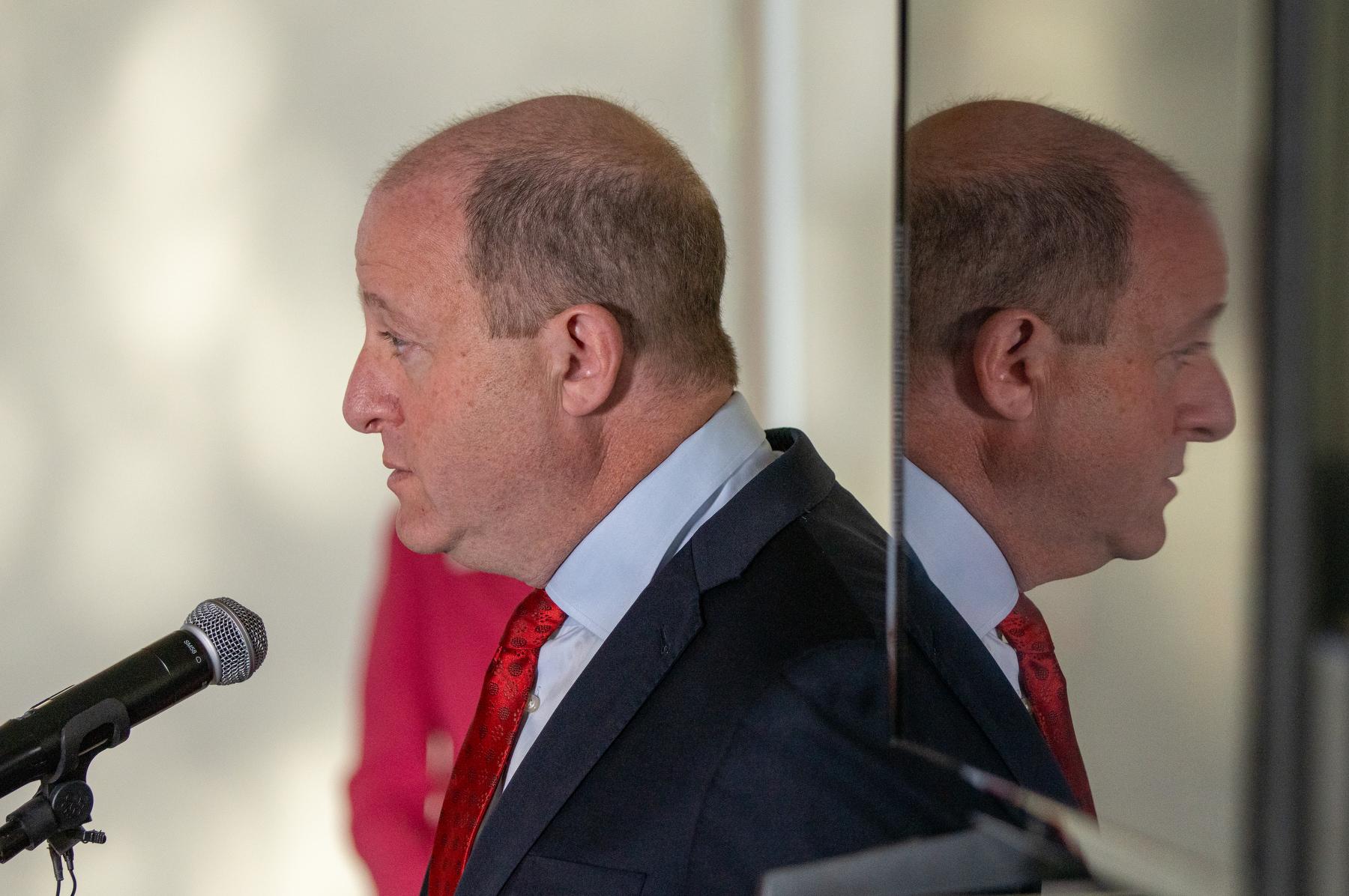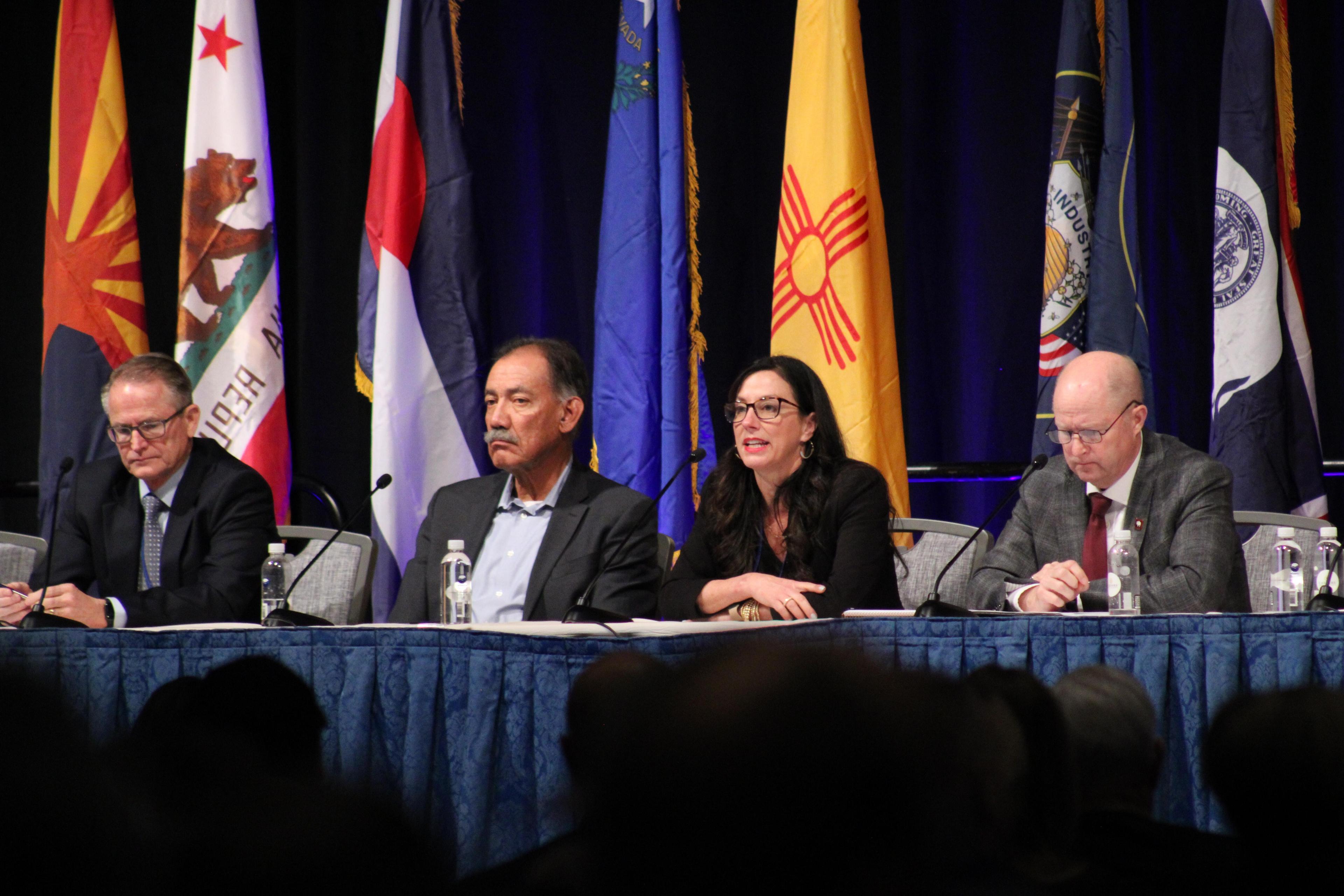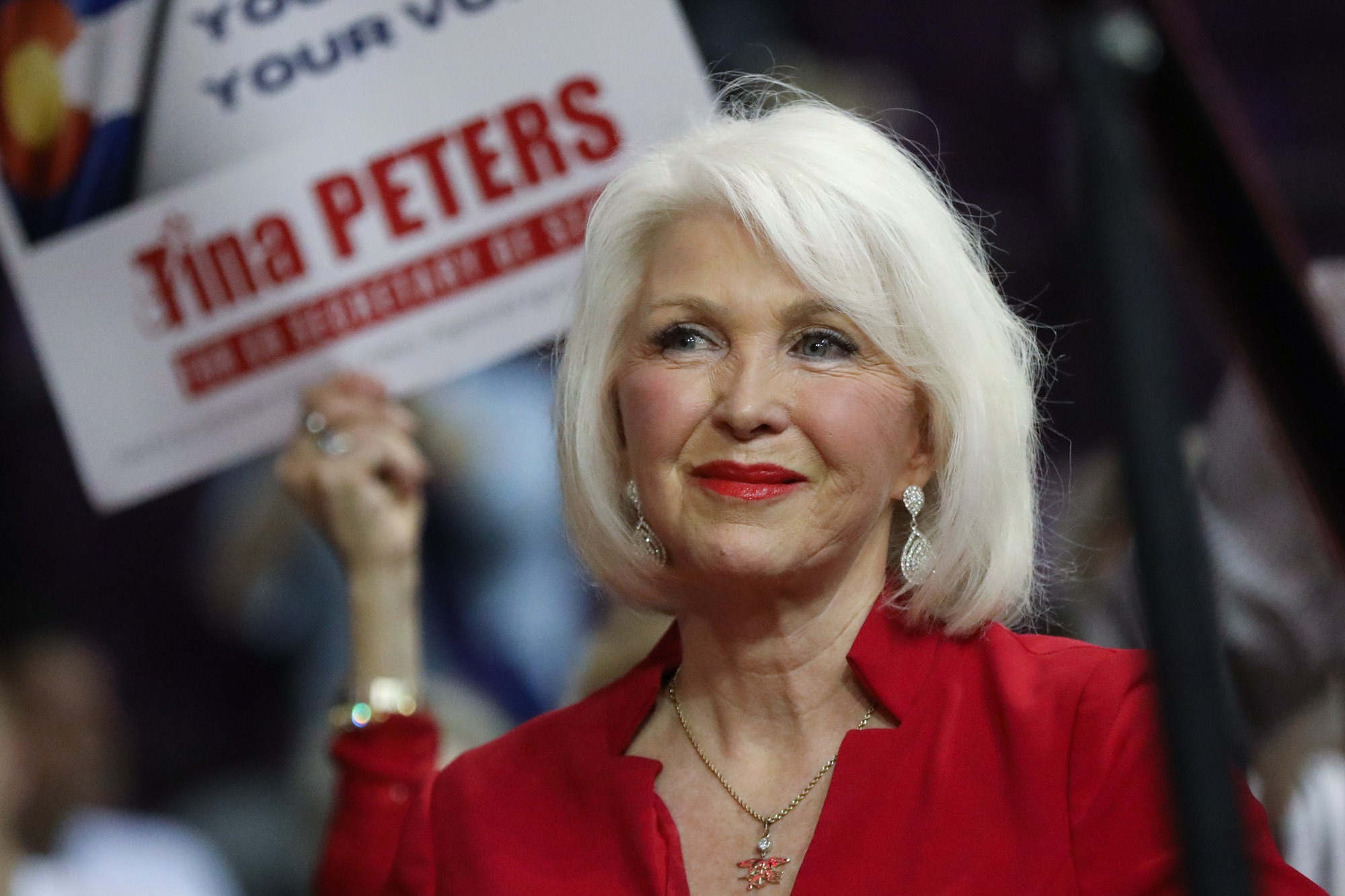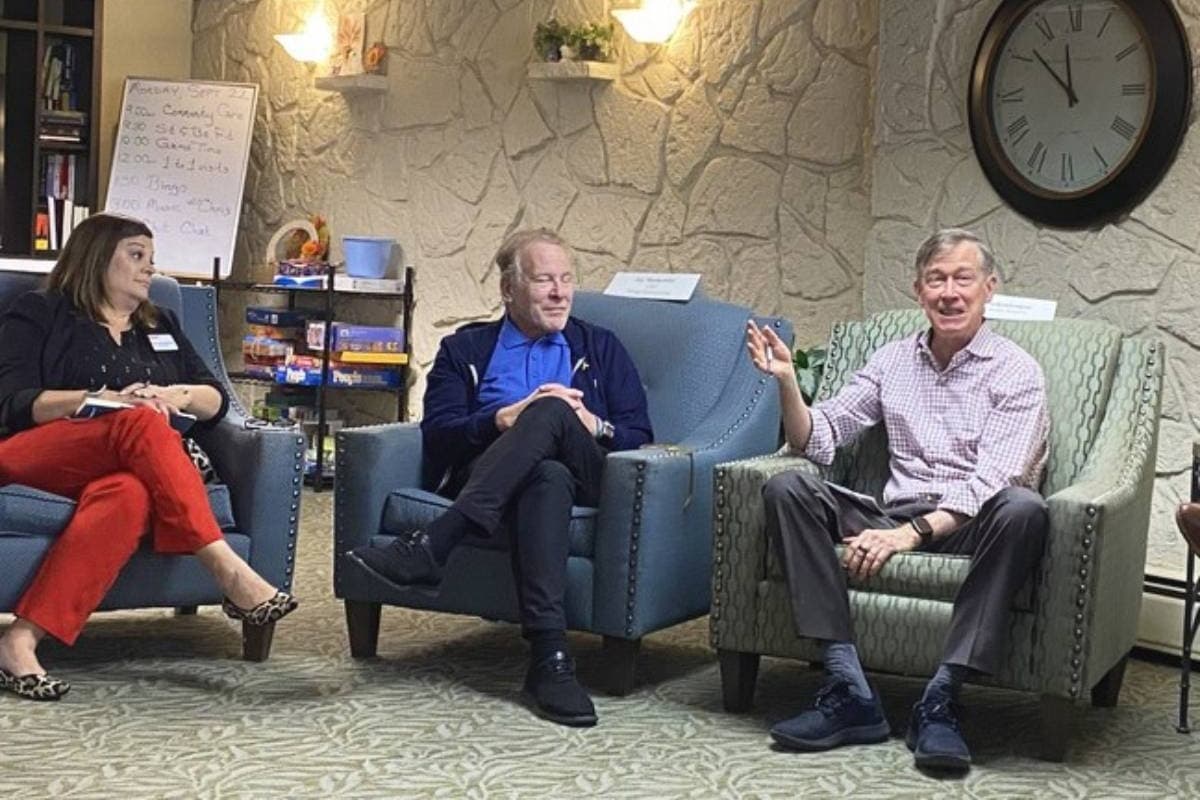
Fear.
That’s the word that stood out Monday, as Sen. John Hickenlooper visited the WestLake Care Community, a skilled nursing facility in Lakewood.
In its lobby, he met with residents, caregivers and administrators. They talked about worries over the impact of unprecedented cuts in the Republican-led Congress to Medicaid, the federal-state program that covers millions of low-income Americans, including the elderly, people with disabilities, pregnant women, adults and children. The program covers almost all of the residents at WestLake.
A man who goes by Murph, with a deep voice and a Broncos cap, said Medicaid saved his life. He also credited family and Medicare, the federal health insurance program for those 65 and older and people with disabilities.
“There's no way. I mean, I'd still be out on the street if it wasn't for that. My Social Security is not enough to live on at this point in time,” said Murph, whose full name is Michael Murphy, who said he has epilepsy, a brain condition that causes seizures. It requires him to take medications.
“It'd take every dime I make for a little hovel of an apartment and then what, you know? So I gotta have that help. I just have to, and I know I'm not alone,” said Murph, who is 68 and worked as a floor installer in Denver for years.
“Pretty much everybody here's in the same boat, I don't know how many people here are independently wealthy, but I don't believe it's a lot,” he said with a laugh. “So it's really important for us. It really is.”
The state’s healthcare system is bracing to be rocked by a series of shocks caused by the nearly trillion-dollar federal cut to Medicaid in the tax and spending bill passed by Congress.
The cuts came as Colorado faced its own $1 billion shortfall, with another $1 billion budget chasm expected next year.
Big changes to the system
Health coverage for more than 400,000 Coloradans will see funding cuts to what are called hospital provider fees. Nearly that number will have to follow strict new Medicaid rules, including work requirements, which is expected to cause many to lose that coverage.
People like Murph and other residents at WestLake who spoke said they don’t know what it means for them. But they fear it can’t be good.
“I don't know what the answer is,” he said. “But man, we've gotta somehow save Medicare and Medicaid. We can't just slash it. People depend on it,” Murph said.
“I can't make it without Medicaid because that's what pays for some of my things,” said Jamie Van Holland, another resident, noting of more than 65 residents at the facility, almost all are Medicaid enrollees. “It pays for all my food and some of my meds and stuff. And I take a lot of meds 'cause I'm a diabetic, so that all costs a lot.”
She worried Medicaid cuts would lead to staff cuts at her facility. “So it hits us in all kinds of ways,” she said.
Hickenlooper fields worries
As the tax and spending bill made its way through Congress earlier this year, Republicans defended the cuts as important to limiting what they described as waste, fraud and abuse in federal health programs. Eighth district Rep. Gabe Evans, for example, said Medicaid could be streamlined without cuts to “lawful beneficiaries.”
Hickenlooper told the group his office has been flooded in recent months with calls and emails from those enrolled in Medicaid and older residents fearful of their future. Others calling federal agencies looking for help or information can’t get through due to cutbacks, he said.
“They're worried they're gonna end with no place, no bed. They're gonna end up homeless out on the street and have to stay in shelters. It's very sobering,” he said. “I don't think most Republicans understood when they pushed this through. I don't think they really understood how the system works and what the consequences would be.”
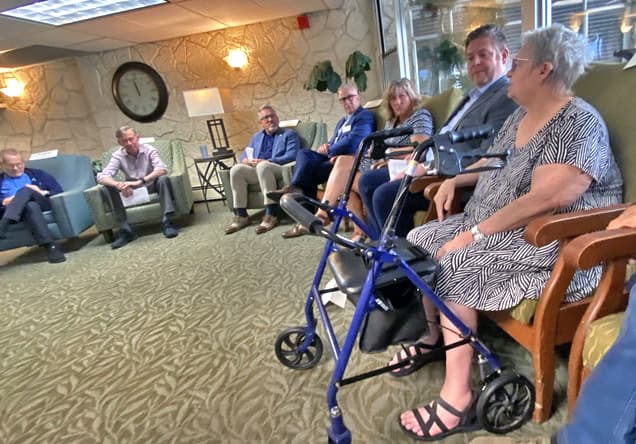
Hickenlooper said he and other Democrats are pushing to get health funding restored, including in an emerging fight over a possible government shutdown, though they don’t control either chamber of Congress or the presidency.
“Leave the tax cuts for the working people,” he said. “But don't give tax cuts to the people that are really rich. If it means taking food out of the mouths of these senior citizens. A lot of this place (WestLake) is full of veterans. These guys risked their lives for our country.”
The misery factor
Typically, federal dollars help fund state Medicaid programs and ultimately facilities like WestLake and others. But when the flow of dollars is dramatically reduced or even shut off, it’s incredibly challenging for states like Colorado to make up the gap.
“What we're hearing a lot of now from our clients in home care is they are so afraid,” said Chris Lynn, president of the Wheat Ridge-based Senior Resource Center, which aims to help older adults continue to live at home.
“We're really concerned about the fear level that people have right now, and it's causing them just so much angst. And we're seeing that their health is deteriorating because of it,” he said. “These cuts are detrimental on so many levels. But what it really comes down to is the individual human side of it. You watch people just deteriorate really quickly.”
Medicaid also plays a vital role in helping someone with advanced illness to transition from a hospital to a facility providing long-term care. Vouchers help them stay in a hotel for the homeless while they make the transition to Medicaid coverage, said Leslie Kalechman, a volunteer with AARP and retired social worker.
“I can tell you that a hotel or in the streets is no place for a sick, acutely or chronically ill person,” she said, adding she hadn’t read the whole federal budget bill. “I believe just with the attitude and the atmosphere, I'm so afraid that some things are going to be cut, and people don't even realize what they mean.”
If acutely or chronically ill, older or frail people don’t get health care in a timely way, they risk ending up back in the emergency department, which is far more expensive. “Not to mention just the misery factor,” Kalechman.
Waiting for the tidal wave
Most of the cuts to Medicaid take effect at the start of 2027. It’ll be up to the state to make further reductions, but just what those could be isn’t clear. So waiting to see what will happen is a bit like watching for a tsunami. An earthquake has hit in the form of these cuts, and their impact will come crashing back to the shore.
“We have not taken meaningful cuts in long-term care or in senior living, so assisted living or nursing homes,” said Doug Farmer, president and CEO of the Colorado Health Care Association, which represents nursing homes and assisted living facilities.
“But as we look at the bigger picture down the road, there's a lot of anxiety about what will happen,” he said. “If there were any meaningful cuts to Medicaid from where we are right now, we would start to see nursing homes go out of business and close,” starting with rural and smaller facilities.
The entire system is complex and fragile, and problems in one part can affect the whole thing, he said.
“It's nerve-racking, he said. “What you're experiencing right now is just a lot of anxiety from people, waiting to see what actually will happen when and how it will present itself, and then how we will react.”
| This story is part of a collection tracking the impacts of President Donald Trump’s second administration on the lives of everyday Coloradans. Since taking office, Trump has overhauled nearly every aspect of the federal government; journalists from CPR News, KRCC and Denverite are staying on top of what that means for you. Read more here. |

